AFFF Testicular Cancer Lawsuit
- Last Updated: July 14th, 2025

Attorney Jessica Paluch-Hoerman, founder of TruLaw, has over 28 years of experience as a personal injury and mass tort attorney, and previously worked as an international tax attorney at Deloitte. Jessie collaborates with attorneys nationwide — enabling her to share reliable, up-to-date legal information with our readers.
Legally Reviewed
This article has been written and reviewed for legal accuracy and clarity by the team of writers and legal experts at TruLaw and is as accurate as possible. This content should not be taken as legal advice from an attorney. If you would like to learn more about our owner and experienced injury lawyer, Jessie Paluch, you can do so here.
Fact-Checked
TruLaw does everything possible to make sure the information in this article is up to date and accurate. If you need specific legal advice about your case, contact us by using the chat on the bottom of this page. This article should not be taken as advice from an attorney.
Key takeaways:
- Men diagnosed with testicular cancer after AFFF exposure can still file lawsuits in 2025, as personal injury cases continue being accepted into MDL 2873 with October 2025 bellwether trials scheduled.
- A 2023 National Institutes of Health study of over 1,000 Air Force servicemen found direct correlations between PFAS blood levels from firefighting foam exposure and testicular cancer diagnoses.
- AFFF firefighting foam lawsuits operate on contingency fee basis (33-40% of recovery), requiring occupational exposure of typically one year or more followed by testicular cancer diagnosis for eligibility.
Can I Still File an AFFF Testicular Cancer Lawsuit?
Question: Can I still file an AFFF testicular cancer lawsuit?
Answer: Yes, men diagnosed with testicular cancer after AFFF exposure can still file foam cancer lawsuits in 2025, as personal injury cases continue being accepted into MDL 2873 while preparations advance for October 2025 bellwether trials.
The statute of limitations for testicular cancer claims typically runs from the date of diagnosis rather than exposure, giving many veterans and firefighters who recently discovered their cancer’s connection to AFFF the opportunity to seek justice through AFFF firefighting foam litigation.
On this page, we’ll discuss this question in further depth, major defendants in AFFF litigation, timing considerations for testicular cancer claims, and much more.
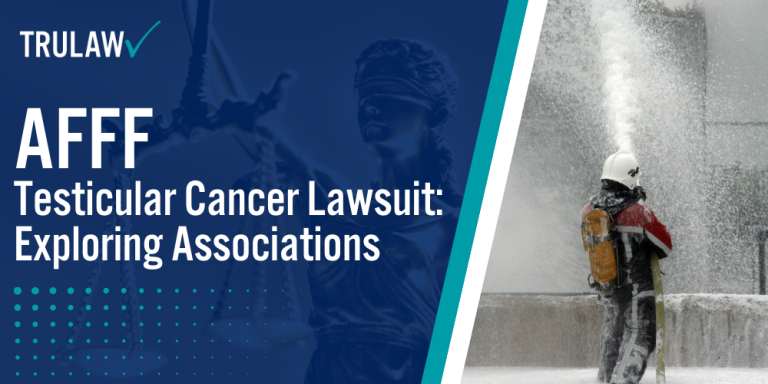
Scientific Evidence Linking AFFF to Testicular Cancer
A groundbreaking National Institutes of Health study of over 1,000 Air Force servicemen found direct correlations between PFAS blood levels from firefighting foam exposure and testicular cancer diagnoses, highlighting the health risks associated with these toxic chemicals.
Military bases using AFFF for decades created exposure scenarios where personnel absorbed PFAS through skin contact, inhalation, and contaminated drinking water, multiplying cancer risks.
Testicular cancer symptoms including testicular lumps, swelling, pain, or hormonal changes often appeared 10-20 years after intensive AFFF exposure during service, prompting many veterans to join the AFFF firefighting foam MDL.
If you or someone you love has been diagnosed with kidney and testicular cancer after AFFF exposure, you may be eligible to seek compensation.
Contact TruLaw using the chat on this page to receive an instant case evaluation that can help you determine if you qualify to file an AFFF Lawsuit today.
Table of Contents
AFFF and Its Connection to Testicular Cancer
Aqueous Film-Forming Foam (AFFF) contains per- and polyfluoroalkyl substances (PFAS), synthetic chemicals used extensively in firefighting operations since the 1960s at military installations, airports, and industrial facilities worldwide, leading to numerous AFFF firefighting foam cases.
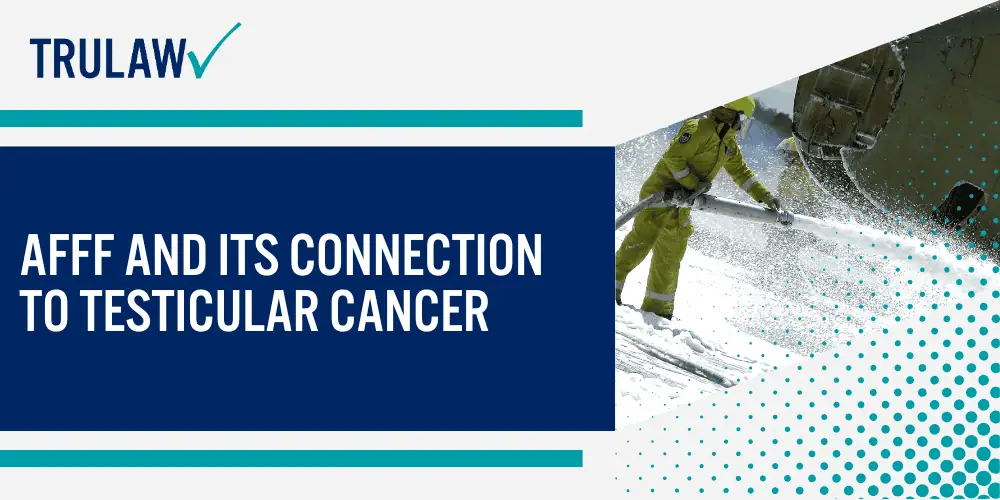
These “forever chemicals” persist indefinitely in both the environment and human body, with mounting scientific evidence specifically linking PFAS exposure to elevated testicular cancer rates among firefighters and military personnel who regularly handled this firefighting foam, as well as increased risks of thyroid disease.
What Makes AFFF Dangerous to Human Health
PFAS chemicals, particularly perfluorooctane sulfonate (PFOS) and perfluorooctanoic acid (PFOA), persist in human tissue because they resist natural breakdown processes, accumulating with half-lives ranging from 2.9 years for PFOS to 3.8 years for PFOA, making them some of the most persistent toxic chemicals known to science.
These synthetic compounds bind to proteins in blood plasma and concentrate in organs throughout the body, disrupting normal biological functions in those regularly exposed to firefighting foam.
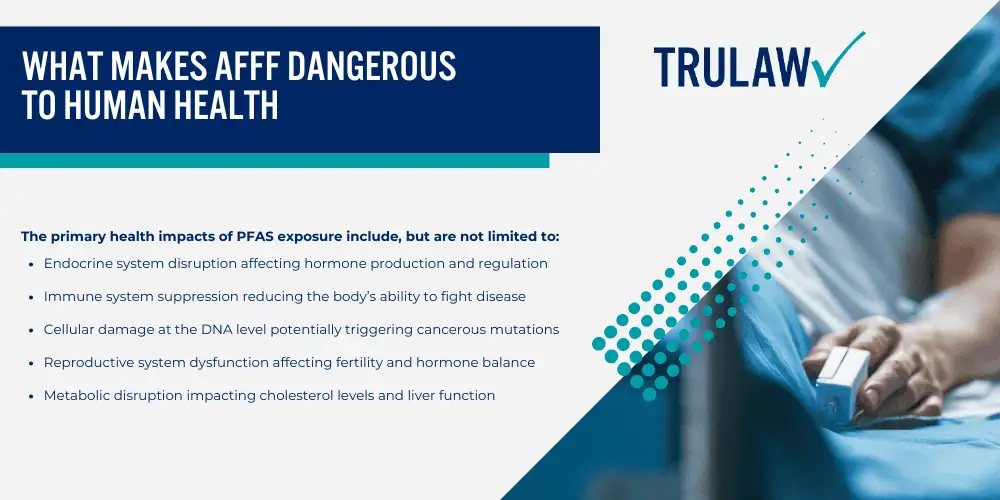
The primary health impacts of PFAS exposure include, but are not limited to:
- Endocrine system disruption affecting hormone production and regulation
- Immune system suppression reducing the body’s ability to fight disease
- Cellular damage at the DNA level potentially triggering cancerous mutations
- Reproductive system dysfunction affecting fertility and hormone balance
- Metabolic disruption impacting cholesterol levels and liver function
PFAS chemicals accumulate preferentially in reproductive tissues where they interfere with testosterone signaling and other hormonal pathways important to normal cellular function, particularly from AFFF foam exposure.
The carbon-fluorine bonds in these compounds create extraordinary stability, preventing the body’s natural detoxification processes from eliminating them effectively, contributing to increased prostate cancer risk.
Who Faces the Highest Risk of AFFF Exposure
Military personnel stationed at over 700 contaminated bases across the United States face particularly high exposure risks, along with civilian firefighters who used AFFF during training exercises and emergency responses, with many now developing testicular cancer.
Airport workers, industrial facility employees, and chemical plant operators who handled or were present during AFFF deployment also experienced occupational exposure to these toxic substances, leading experienced AFFF lawyers to pursue compensation for victims.
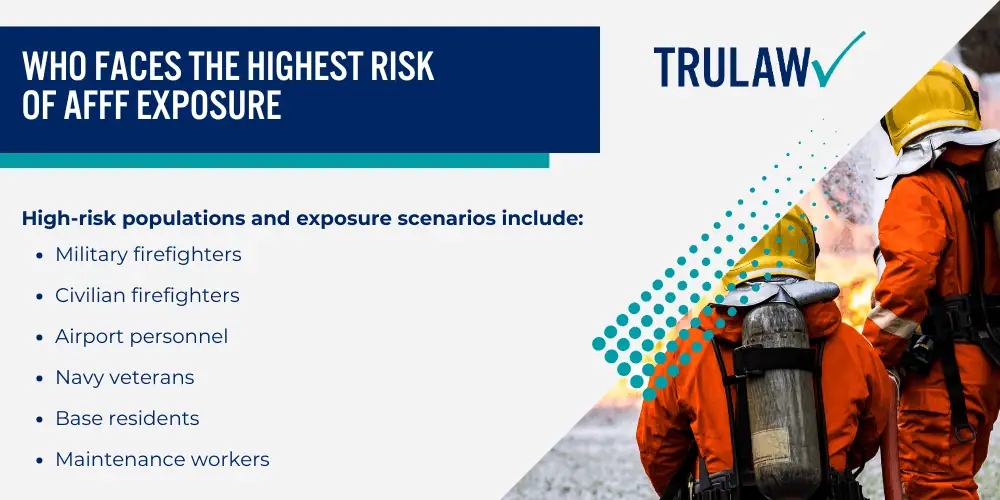
High-risk populations and exposure scenarios include:
- Military firefighters: Regular training exercises and aircraft fire suppression
- Civilian firefighters: Municipal and industrial fire response operations
- Airport personnel: Aircraft rescue and firefighting operations
- Navy veterans: Shipboard firefighting systems containing AFFF
- Base residents: Living quarters near fire training areas
- Maintenance workers: Cleaning and servicing firefighting equipment
Residential communities near military installations, airports, and industrial facilities face ongoing exposure through contaminated groundwater and soil, resulting in kidney cancer cases and other serious illnesses.
The Environmental Working Group has documented PFAS contamination affecting drinking water supplies for millions of Americans, with concentrations often exceeding federal safety guidelines by large margins, following decades of AFFF firefighting foam exposure.
The Testicular Cancer Connection Explained
Testicular cancer predominantly affects young men between the ages of 15 and 35, making it the most common cancer diagnosis in this demographic, with firefighters and military personnel showing substantially higher incidence rates compared to the general population, leading to numerous AFFF foam lawsuits.
Research indicates that PFAS exposure disrupts normal testosterone production and interferes with reproductive hormone signaling pathways important for healthy testicular function, as AFFF manufacturers like Tyco Fire Products continued selling these products despite knowing the risks.
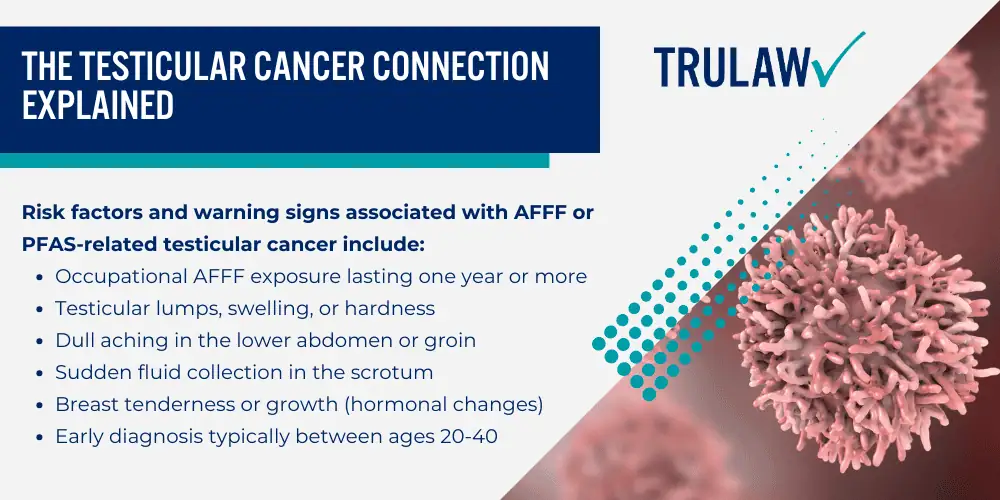
Risk factors and warning signs associated with AFFF or PFAS-related testicular cancer include:
- Occupational AFFF exposure lasting one year or more
- Testicular lumps, swelling, or hardness
- Dull aching in the lower abdomen or groin
- Sudden fluid collection in the scrotum
- Breast tenderness or growth (hormonal changes)
- Early diagnosis typically between ages 20-40
PFAS chemicals bind to androgen receptors in testicular tissue, mimicking or blocking natural testosterone activity and potentially triggering abnormal cell growth that develops into malignant tumors, supporting kidney cancer claims as well.
These compounds’ endocrine-disrupting properties interfere with the delicate hormonal balance required for normal testicular cell division and differentiation, presenting serious health risks to exposed individuals.
If you or a loved one developed testicular cancer after AFFF exposure during military service or firefighting duties, you may be eligible to seek compensation through firefighting foam cancer lawsuits.
Contact TruLaw using the chat on this page to receive an instant case evaluation and determine whether you qualify to join others in filing an AFFF lawsuit today.
Determining Your Eligibility for an AFFF Lawsuit
Eligibility extends beyond current patients to include families of deceased firefighters and military personnel who lost their lives to testicular cancer after occupational AFFF exposure, providing avenues for wrongful death claims in appropriate circumstances, as testicular cancer research continues to strengthen these cases.
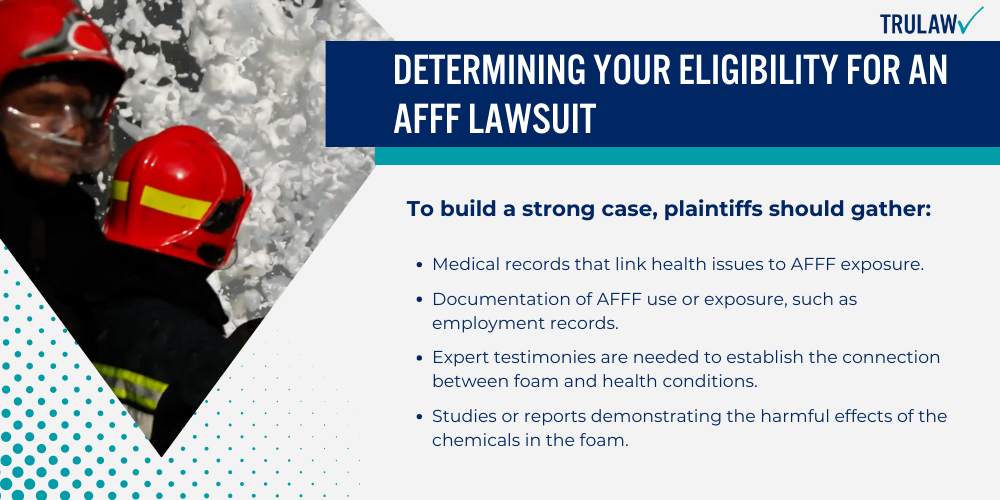
Core Eligibility Requirements
The fundamental requirement for pursuing an AFFF cancer lawsuit involves demonstrating regular occupational exposure to firefighting foam, typically for a minimum of one year, followed by a testicular cancer diagnosis that medical experts can link to PFAS contamination.
Courts recognize that the latency period between initial exposure and cancer development often spans years or decades, making historical exposure from the 1960s onward potentially actionable today, particularly for those exposed to fire fighting foam containing PFAS.
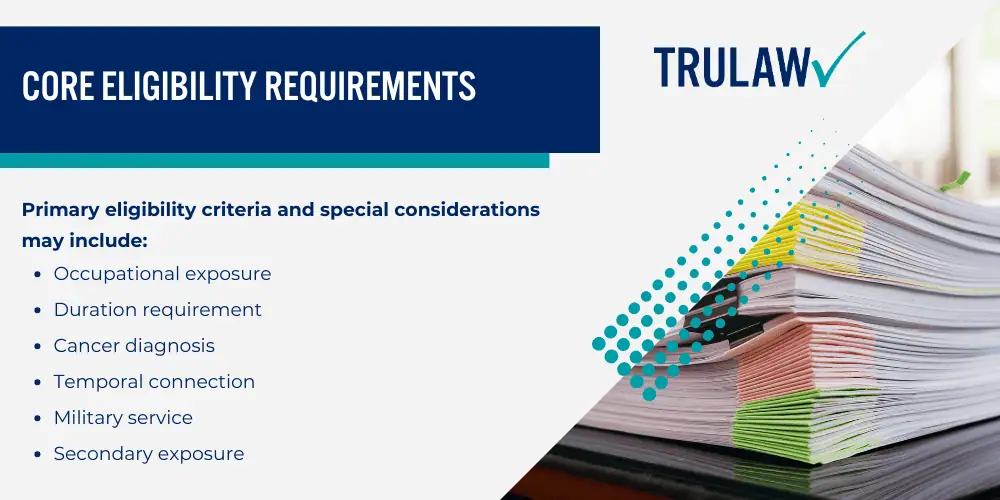
Primary eligibility criteria and special considerations may include:
- Occupational exposure: Regular AFFF contact through firefighting, training, or equipment maintenance
- Duration requirement: Generally one year or more of cumulative exposure
- Cancer diagnosis: Confirmed testicular cancer diagnosis with medical documentation
- Temporal connection: Cancer development after exposure period (no specific timeframe required)
- Military service: Veterans must have received honorable or general discharge
- Secondary exposure: Equipment cleaners, base residents may qualify with sufficient exposure
- Family history: Genetic predisposition does not disqualify claims
Special consideration applies to veterans seeking compensation, as military service records must reflect an honorable or general discharge status to maintain eligibility for lawsuit participation, particularly those with health issues beyond testicular cancer.
Family history of testicular cancer does not preclude filing a claim, as courts recognize PFAS exposure as an independent risk factor capable of triggering cancer regardless of genetic predisposition, including pancreatic cancer in some cases.
Types of Evidence Needed
Building a strong AFFF lawsuit requires comprehensive documentation proving both occupational exposure to firefighting foam and subsequent testicular cancer diagnosis through medical records and employment verification.
Military service records, base assignments, firefighting duty logs, and training certificates establish the exposure timeline, while pathology reports and oncology treatment records confirm the cancer diagnosis following exposure to PFAS.
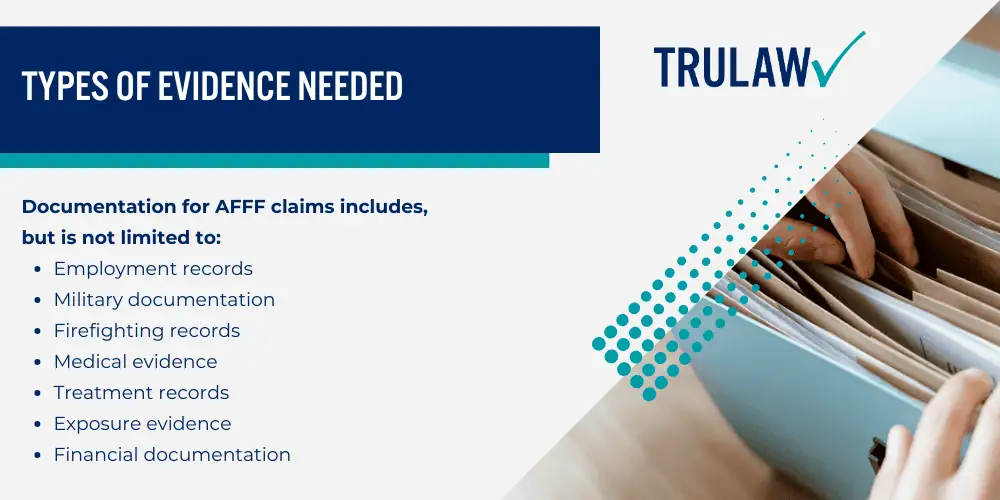
Documentation for AFFF claims includes, but is not limited to:
- Employment records: Service history, duty stations, job assignments
- Military documentation: DD-214 forms, base assignment orders, MOS records
- Firefighting records: Training logs, incident reports, equipment maintenance records
- Medical evidence: Pathology reports confirming testicular cancer diagnosis
- Treatment records: Oncology notes, surgical reports, chemotherapy documentation
- Exposure evidence: Witness statements, unit histories, base contamination reports
- Financial documentation: Medical bills, lost wage statements, insurance records
Attorneys specializing in AFFF litigation understand how to obtain missing records through Freedom of Information Act requests for military personnel or employer record requests for civilian firefighters, addressing significant health risks from exposure.
The strength of your claim often depends on the completeness of documentation establishing both the duration of exposure and the severity of health impacts, including those who develop testicular cancer years after service.
Time Limits and Deadlines
Unlike many personal injury claims, AFFF lawsuits benefit from extended filing periods due to the recognized latency between chemical exposure and cancer development, acknowledging the potential health risks that manifest years later.
While no general statute of limitations currently applies to AFFF exposure claims, wrongful death cases face strict deadlines that vary by state, typically ranging from one to three years after death.
The timing considerations for AFFF claims include:
- Discovery rule application: Limitations period begins when cancer is diagnosed, not at exposure
- Wrongful death deadlines: State-specific limits of 1-3 years from date of death
- MDL registration: Court-imposed deadlines for joining consolidated proceedings
- Settlement participation: Early filing ensures inclusion in global resolutions
- Evidence preservation: Prompt action prevents loss of records or witness availability
- Case tier assignment: Earlier filing may result in favorable classification
Filing promptly ensures your case receives proper evaluation for tier classification within MDL 2873, where Tier 1 designation represents the strongest claims with optimal documentation and clear causation evidence supported by scientific research.
TruLaw partners with AFFF litigation leaders to provide clients with the legal resources and support necessary for a successful outcome, including those pursuing an AFFF class action lawsuit.
Contact TruLaw using the chat on this page to receive an instant case evaluation and determine whether you qualify to join others in filing an AFFF lawsuit today.
Scientific Evidence Linking AFFF to Testicular Cancer
The scientific community has produced an expanding body of peer-reviewed research establishing clear connections between PFAS exposure and testicular cancer, with landmark studies from the National Institutes of Health, Purdue University, and the C8 Health Project providing compelling evidence for the AFFF MDL.
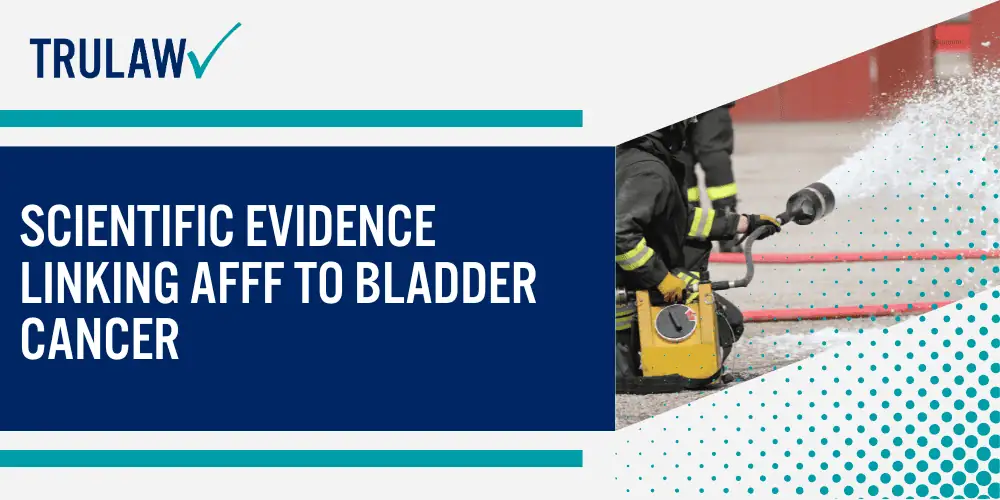
Courts overseeing the AFFF multidistrict litigation have acknowledged this strong causation evidence, scheduling Science Day presentations to examine how these forever chemicals trigger malignant transformations in reproductive tissue.
Breakthrough Studies on PFAS and Testicular Cancer
The 2023 National Cancer Institute study, conducted in collaboration with Purdue University and published in Environmental Health Perspectives, examined 530 Air Force servicemen with testicular cancer and matched controls, finding that elevated blood levels of PFOS were associated with increased testicular cancer risk.
This research represents the first large-scale military study directly linking firefighting foam exposure to testicular germ cell tumors, which comprise approximately 95% of all testicular cancer cases.
Key findings from major PFAS-testicular cancer studies include, but are not limited to:
- NIH/Purdue 2023: Elevated PFOS levels linked to testicular cancer in Air Force personnel
- Service-related predictors: Firefighting duties showed strongest association with PFAS concentrations
- Risk elevation: Higher PFOS concentrations correlated with increased relative risk
- Sample size: 530 testicular cancer cases analyzed with matched controls
- Publication: Environmental Health Perspectives peer-reviewed journal
The C8 Health Project, investigating PFOA contamination near DuPont’s West Virginia facility, documented elevated testicular cancer rates among exposed populations compared to unexposed communities.
This massive epidemiological study examined over 69,000 participants and established probable links between PFOA exposure and six diseases, with testicular cancer showing particularly strong associations alongside kidney cancer.
How PFAS Causes Cancer at the Cellular Level
PFAS compounds function as potent endocrine disruptors, interfering with androgen receptors and testosterone signaling pathways that regulate normal cellular division and differentiation in reproductive tissues.
Research demonstrates that PFOA and PFOS bind directly to hormone receptors, mimicking or blocking natural testosterone activity and triggering cascading disruptions throughout the endocrine system, as documented by the National Cancer Institute’s PFAS research program.
The cellular mechanisms of PFAS-induced carcinogenesis include, but are not limited to:
- Androgen receptor interference: PFAS binding disrupts normal testosterone signaling
- Epigenetic modifications: Altered gene expression patterns without DNA sequence changes
- Oxidative stress induction: Free radical damage to cellular structures and DNA
- Cell cycle disruption: Interference with normal cellular division checkpoints
- Apoptosis inhibition: Prevention of programmed cell death in damaged cells
- Inflammatory pathway activation: Chronic inflammation promoting tumor development
Studies from the University of Illinois Cancer Center reveal that PFAS accumulates specifically in reproductive organs where it can disrupt regulatory pathways controlling cell growth and differentiation.
The persistence of these compounds in testicular tissue creates prolonged exposure at the cellular level, increasing opportunities for malignant transformation through multiple interconnected mechanisms affecting hormone signaling, DNA integrity, and cellular metabolism.
Legal Recognition of the Science
The International Agency for Research on Cancer (IARC) officially classified PFOA as a Group 1 human carcinogen in November 2023, placing it in the same category as asbestos and tobacco.
Based on strong mechanistic evidence, the IARC designated PFOS as a possible Group 2 B carcinogen.
These classifications represent the culmination of decades of research and carry weight in legal proceedings, as courts recognize IARC determinations as authoritative assessments of carcinogenic potential.
Regulatory and legal milestones recognizing PFAS cancer risks include, but are not limited to:
- IARC Group 1 Classification: PFOA designated “carcinogenic to humans” (November 2023)
- IARC Group 2B Classification: PFOS designated “possibly carcinogenic to humans”
- MDL 2873 Recognition: Federal court acknowledges strong causation evidence
- Science Day Presentations: Expert testimony scheduled for June 6 and June 20, 2025
- Environmental Protection Agency (EPA) Maximum Contaminant Levels: 4 parts per trillion for PFOA and PFOS in drinking water
Federal judges overseeing MDL 2873 have acknowledged the strength of scientific evidence linking AFFF exposure to cancer, scheduling Science Day presentations where leading experts will present mechanistic and epidemiological findings to the court.
This judicial recognition of the science creates a foundation for plaintiffs seeking compensation, as courts increasingly accept the causal relationship between PFAS exposure and testicular cancer based on convergent lines of evidence from laboratory, animal, and human studies.
If you served as a firefighter or military personnel and developed testicular cancer after AFFF exposure, the scientific evidence strongly supports your potential claim for financial compensation.
Contact TruLaw using the chat on this page to receive an instant case evaluation and determine whether you qualify to join others in filing an AFFF lawsuit today.
How Can an AFFF Firefighting Foam Attorney from TruLaw Help You?
Our AFFF firefighting foam attorney at TruLaw is dedicated to supporting clients through the process of filing an AFFF firefighting foam lawsuit.
With extensive experience in chemical-exposure litigation, Jessica Paluch-Hoerman and our partner law firms work with industry leaders to prove how toxic PFAS chemicals in AFFF firefighting foam—and the resulting contamination of water supplies—caused you harm.

TruLaw focuses on securing compensation for medical expenses, pain and suffering, property damage, lost income, and ongoing health monitoring resulting from your AFFF exposure.
We understand the health and environmental impacts of AFFF firefighting foam on your life and provide the personalized guidance you need when seeking justice.
Meet the Lead AFFF Firefighting Foam Attorney at TruLaw
- Jessica Paluch-Hoerman: As founder and managing attorney of TruLaw, Jessica brings her product-liability and personal-injury experience to a client-centered approach that prioritizes open communication and personalized attention. Through TruLaw and its partner firms, she has helped recover more than $3 billion for injured individuals across all 50 states via verdicts and negotiated settlements.
How much does hiring an AFFF firefighting foam lawyer from TruLaw cost?
At TruLaw, we believe financial concerns should never stand in the way of justice.We operate on a contingency-fee basis—you pay legal fees only after you recover compensation.
If you or a loved one developed cancer or another serious illness after long-term exposure to AFFF firefighting foam (or PFAS-contaminated water linked to AFFF use), you may be eligible to seek compensation.
Contact TruLaw using the chat on this page to receive an instant case evaluation and determine whether you qualify to join others in filing an AFFF Firefighting Foam Lawsuit today.
TruLaw: Accepting Clients for the AFFF Lawsuit
AFFF lawsuits are being filed by firefighters, military veterans, airport personnel, and others nationwide after years of repeated exposure to toxic firefighting foam (AFFF) that contains per- and polyfluoroalkyl substances (PFAS).
TruLaw is currently accepting clients for the AFFF firefighting foam lawsuit.
A few reasons to choose TruLaw for your AFFF firefighting foam lawsuit include:
- If We Don’t Win, You Don’t Pay: The AFFF firefighting foam lawyers at TruLaw and our partner firms work on a contingency-fee basis— we only get paid if you win.
- Expertise: We have decades of experience handling toxic-exposure cases like the AFFF firefighting foam lawsuit.
- Successful Track Record: TruLaw and our partner firms have helped clients recover billions of dollars in compensation through verdicts and negotiated settlements.
If you or a loved one developed cancer or another serious illness after long-term exposure to AFFF firefighting foam, you may be eligible to seek compensation.
Contact TruLaw using the chat on this page to receive an instant case evaluation and learn whether you qualify for the AFFF Lawsuit today.
AFFF Lawsuit Frequently Asked Questions
-
Yes, having a family history of testicular cancer does not disqualify you from filing an AFFF lawsuit, as courts recognize that PFAS exposure represents an independent risk factor capable of triggering cancer development regardless of genetic predisposition.
Legal precedent acknowledges that environmental toxins like those found in firefighting foam can cause cancer in individuals both with and without hereditary risk factors, making your claim viable based on exposure history and subsequent diagnosis.
-
While most AFFF lawsuits require an actual cancer diagnosis for compensation, some jurisdictions are developing medical monitoring programs for individuals with documented exposure who remain cancer-free, allowing for regular health screenings to detect potential issues early.
These monitoring programs recognize that PFAS chemicals remain in the body for years, and early detection improves treatment outcomes, though availability varies by location and specific exposure circumstances.
-
AFFF lawsuits typically operate on a contingency fee basis, meaning you pay no upfront costs or hourly fees, with attorneys collecting their payment (usually 33-40% of any recovery) only if they successfully secure compensation for your claim.
This arrangement ensures that financial constraints don’t prevent legitimate claims from moving forward, as law firms absorb all litigation costs including expert witnesses, medical record retrieval, and court filing fees until a favorable resolution is achieved.
-
Yes, surviving spouses, children, or estate representatives can pursue wrongful death claims when a firefighter or military service member dies from testicular cancer linked to AFFF exposure, though these claims face strict statute of limitations ranging from one to three years depending on state law.
Documentation requirements remain similar to personal injury claims, including proof of AFFF exposure and medical records establishing testicular cancer as the cause of death.
-
The $12.5 billion settlement with 3M and additional settlements with DuPont address municipal water system contamination and cleanup costs, compensating communities for infrastructure improvements and remediation efforts rather than individual health impacts.
Personal injury settlements, currently being negotiated in MDL 2873, focus specifically on compensating individuals who developed cancer or other serious health conditions from AFFF exposure, representing entirely separate legal proceedings with different compensation structures.
-
The scientific evidence connecting AFFF exposure to testicular cancer is exceptionally strong, highlighted by the 2023 NIH/Purdue study of Air Force servicemen showing elevated PFOS levels directly correlating with increased cancer risk, alongside C8 Health Project findings documenting higher rates among exposed populations.
Federal courts overseeing MDL 2873 have acknowledged this robust causation evidence, scheduling Science Day presentations to examine the biological mechanisms, while the International Agency for Research on Cancer’s classification of PFOA as a Group 1 human carcinogen further validates the connection.
If you or a loved one developed testicular cancer after exposure to AFFF firefighting foam, you may be eligible to seek compensation.
Contact TruLaw using the chat on this page to receive an instant case evaluation and determine whether you qualify to join others in filing an AFFF Lawsuit today.

Managing Attorney & Owner
With over 25 years of legal experience, Jessica Paluch-Hoerman is an Illinois lawyer, a CPA, and a mother of three. She spent the first decade of her career working as an international tax attorney at Deloitte.
In 2009, Jessie co-founded her own law firm with her husband – which has scaled to over 30 employees since its conception.
In 2016, Jessie founded TruLaw, which allows her to collaborate with attorneys and legal experts across the United States on a daily basis. This hypervaluable network of experts is what enables her to share the most reliable, accurate, and up-to-date legal information with our readers!
Additional AFFF Lawsuit resources on our website:
Here, at TruLaw, we’re committed to helping victims get the justice they deserve.
Alongside our partner law firms, we have successfully collected over $3 Billion in verdicts and settlements on behalf of injured individuals.
Would you like our help?
At TruLaw, we fiercely combat corporations that endanger individuals’ well-being. If you’ve suffered injuries and believe these well-funded entities should be held accountable, we’re here for you.
With TruLaw, you gain access to successful and seasoned lawyers who maximize your chances of success. Our lawyers invest in you—they do not receive a dime until your lawsuit reaches a successful resolution!
AFFF Lawsuit claims are being filed against manufacturers of aqueous film-forming foam (AFFF), commonly used in firefighting.
Claims allege that companies such as 3M, DuPont, and Tyco Fire Products failed to adequately warn users about the potential dangers of AFFF exposure — including increased risks of various cancers and diseases.
Depo Provera Lawsuit claims are being filed by individuals who allege they developed meningioma (a type of brain tumor) after receiving Depo-Provera birth control injections.
A 2024 study found that women using Depo-Provera for at least 1 year are five times more likely to develop meningioma brain tumors compared to those not using the drug.
Suboxone Tooth Decay Lawsuit claims are being filed against Indivior, the manufacturer of Suboxone, a medication used to treat opioid addiction.
Claims allege that Indivior failed to adequately warn users about the potential dangers of severe tooth decay and dental injuries associated with Suboxone’s sublingual film version.
Social Media Harm Lawsuits are being filed against social media companies for allegedly causing mental health issues in children and teens.
Claims allege that companies like Meta, Google, ByteDance, and Snap designed addictive platforms that led to anxiety, depression, and other mental health issues without adequately warning users or parents.
Transvaginal Mesh Lawsuits are being filed against manufacturers of transvaginal mesh products used to treat pelvic organ prolapse (POP) and stress urinary incontinence (SUI).
Claims allege that companies like Ethicon, C.R. Bard, and Boston Scientific failed to adequately warn about potential dangers — including erosion, pain, and infection.
Bair Hugger Warming Blanket Lawsuits involve claims against 3M — alleging their surgical warming blankets caused severe infections and complications (particularly in hip and knee replacement surgeries).
Plaintiffs claim 3M failed to warn about potential risks — despite knowing about increased risk of deep joint infections since 2011.
Baby Formula NEC Lawsuit claims are being filed against manufacturers of cow’s milk-based baby formula products.
Claims allege that companies like Abbott Laboratories (Similac) and Mead Johnson & Company (Enfamil) failed to warn about the increased risk of necrotizing enterocolitis (NEC) in premature infants.
Here, at TruLaw, we’re committed to helping victims get the justice they deserve.
Alongside our partner law firms, we have successfully collected over $3 Billion in verdicts and settlements on behalf of injured individuals.
Would you like our help?
